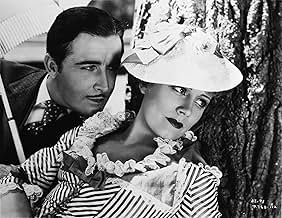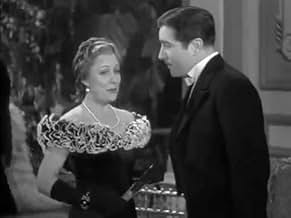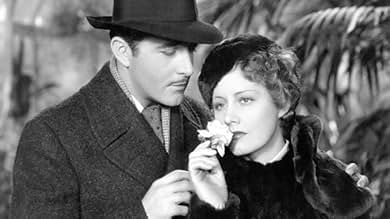CALIFICACIÓN DE IMDb
6.2/10
564
TU CALIFICACIÓN
Agrega una trama en tu idiomaAn engaged attorney and a divorcee fall for each other in 1870s Manhattan.An engaged attorney and a divorcee fall for each other in 1870s Manhattan.An engaged attorney and a divorcee fall for each other in 1870s Manhattan.
- Dirección
- Guionistas
- Elenco
- Premios
- 3 premios ganados en total
Barry O'Moore
- Mr. Welland
- (as Herbert Yost)
Lowden Adams
- Jenkins
- (sin créditos)
Muriel Barr
- Miss Allison - Jenkins' Daughter
- (sin créditos)
Harry Beresford
- Museum Guard
- (sin créditos)
Lynn Browning
- Miss Archer
- (sin créditos)
Herbert Bunston
- W.J. Letterblair
- (sin créditos)
Bess Flowers
- Child's Mother
- (sin créditos)
Alf James
- Man Who Comes with Chairs
- (sin créditos)
John Merton
- John
- (sin créditos)
Opiniones destacadas
Technically speaking, this is a generally well made film. The acting (apart from some serious over-melodramatic acting from John Boles) was good and the entire production looked marvelous. So why, then, only a score of 5? Well, the story seems to try hard to make an excellent point--only to have it undone by plot holes that just don't make a lot of sense. Perhaps in the original Edith Wharton novel this is not the case, but here the film seems to be missing something.
The film begins with Boles ("Newland Archer") becoming engaged with his long time sweetheart, May. They seem like a happy couple and they are going into the upcoming marriage with not a care in the world other than wanting to marry sooner than later. At about the same time, May's cousin (Countess Ellen Olenska--played by Irene Dunne) is arriving from Europe and there is a great scandal because Mrs. Olenska is planning on divorcing her husband--something that polite society at the time would NEVER condone. It is interesting that we never see her husband nor do we really know much about their marriage other than the fact that she is unhappy and wants out--even though her family is strongly in favor of her remaining married. The family's wishes, oddly, are NOT because of a love for Olenska but because they were more concerned about how the scandal would ruin their good name! Many, in fact, were totally unconcerned about her soon to be ex-husband nor about adultery--just what others would think. This hypocrisy made for an excellent theme and I wish the film had really worked more on this angle.
Unfortunately, out of the blue, Archer suddenly announces to the Countess that he loves her!! Where this comes from makes no sense at all--especially since his bride to be is a sweet lady who has done no one wrong. Yet despite this profession, Archer still marries May and they go on their honeymoon. During this time, Archer is distant and quite frankly a major jerk--pining for the Countess and ignoring his poor wife. Frankly, any sympathy you had for the Countess and her divorce is quickly lost because she, too, is conspiring with Archer to run away together. So instead of an excellent story of hypocrisy, the story becomes a story of lust and selfishness--making the viewer really hate Boles and Dunne (especially Boles). All the great buildup of the last hour of the film is practically thrown away when this affair appears out of nowhere.
So what, at this point, is the point of the film? This ambiguity was a serious deficiency with the film. Had Archer never married May and then run off with the Countess, then you might have had a lot of sympathy for the couple. As is, they just seemed nasty and selfish. And the overall message seemed muddled. Were they trying to excuse away adultery or somehow trying to be pro-marriage? I really don't know. Had Archer acted rationally and consistently and less like a weasel, then this message would have been much more clear. As a result, it seriously deadens the impact of this film. It COULD have been much, much better.
The film begins with Boles ("Newland Archer") becoming engaged with his long time sweetheart, May. They seem like a happy couple and they are going into the upcoming marriage with not a care in the world other than wanting to marry sooner than later. At about the same time, May's cousin (Countess Ellen Olenska--played by Irene Dunne) is arriving from Europe and there is a great scandal because Mrs. Olenska is planning on divorcing her husband--something that polite society at the time would NEVER condone. It is interesting that we never see her husband nor do we really know much about their marriage other than the fact that she is unhappy and wants out--even though her family is strongly in favor of her remaining married. The family's wishes, oddly, are NOT because of a love for Olenska but because they were more concerned about how the scandal would ruin their good name! Many, in fact, were totally unconcerned about her soon to be ex-husband nor about adultery--just what others would think. This hypocrisy made for an excellent theme and I wish the film had really worked more on this angle.
Unfortunately, out of the blue, Archer suddenly announces to the Countess that he loves her!! Where this comes from makes no sense at all--especially since his bride to be is a sweet lady who has done no one wrong. Yet despite this profession, Archer still marries May and they go on their honeymoon. During this time, Archer is distant and quite frankly a major jerk--pining for the Countess and ignoring his poor wife. Frankly, any sympathy you had for the Countess and her divorce is quickly lost because she, too, is conspiring with Archer to run away together. So instead of an excellent story of hypocrisy, the story becomes a story of lust and selfishness--making the viewer really hate Boles and Dunne (especially Boles). All the great buildup of the last hour of the film is practically thrown away when this affair appears out of nowhere.
So what, at this point, is the point of the film? This ambiguity was a serious deficiency with the film. Had Archer never married May and then run off with the Countess, then you might have had a lot of sympathy for the couple. As is, they just seemed nasty and selfish. And the overall message seemed muddled. Were they trying to excuse away adultery or somehow trying to be pro-marriage? I really don't know. Had Archer acted rationally and consistently and less like a weasel, then this message would have been much more clear. As a result, it seriously deadens the impact of this film. It COULD have been much, much better.
I just watched The Age of Innocence and although it is a good movie, I wish it were made in color. The Ladies costumes were great and Irene Dunn looks amazing. I have one question, did men in the 1870s wear clothing that were styled much later? John Boles' fedora and suits stepped right out of the 1930s.
Edith Wharton chronicled the romantic tragedies of the 19th century 400, those anointed people who would fit in Lady Astor's Lavish New York Society ballroom. This 1934 film is the story of a young lawyer named Newland Archer who is pledged to a New York girl named May Welland. The marriage is in the offing for most of the film.
What stirs things up is the arrival of a mysterious woman, a Polish Countess named Ellen Olenska, who lives at an unfashionable Manhattan address, west 23rd street. Newland is charmed by the Countess and she, likewise. The Countess is in town to get a divorce. Society is as put off by Mrs. Olenska's frankness as they are with her address.
Teacups rattle at every social turn. Irene Dunne is younger in this film as Countess Olenska than in any other I've seen her in. She upstages every other actor in the film including John Boles who is inept as Newland. The movie seems a star vehicle for Dunne. At least the 1993 remake of Age of Innocence from Director Martin Scorcese gives some weight to the other characters, while failing finally to tell the story adequately. Julie Haydon, who would eventually play Laura in Tennessee Williams' play The Glass Menagerie, is suitably church-mousey as Newland's fiancee, May.
Newland's interest in and defense of the Countess eventually gets him in trouble with the upper-class set who are his peers. When push comes to shove, the question is, what will Archer do, dump the one he promised or run off with the Countess. What actually does happen is a fairly delicate bit of story-telling.
The 1934 Age of Innocence tells the story better than the 1993 version. But the older story isn't really that good either. Mrs. Wharton's novel was a sophisticated piece of work. It deserved a better telling on-screen. If you'd like a well-done thirties social drama, have a look at Dodsworth with Walter Huston, Ruth Chatterton and Mary (yes!) Astor. Age of Innocence is strictly for Irene Dunne aficianados.
What stirs things up is the arrival of a mysterious woman, a Polish Countess named Ellen Olenska, who lives at an unfashionable Manhattan address, west 23rd street. Newland is charmed by the Countess and she, likewise. The Countess is in town to get a divorce. Society is as put off by Mrs. Olenska's frankness as they are with her address.
Teacups rattle at every social turn. Irene Dunne is younger in this film as Countess Olenska than in any other I've seen her in. She upstages every other actor in the film including John Boles who is inept as Newland. The movie seems a star vehicle for Dunne. At least the 1993 remake of Age of Innocence from Director Martin Scorcese gives some weight to the other characters, while failing finally to tell the story adequately. Julie Haydon, who would eventually play Laura in Tennessee Williams' play The Glass Menagerie, is suitably church-mousey as Newland's fiancee, May.
Newland's interest in and defense of the Countess eventually gets him in trouble with the upper-class set who are his peers. When push comes to shove, the question is, what will Archer do, dump the one he promised or run off with the Countess. What actually does happen is a fairly delicate bit of story-telling.
The 1934 Age of Innocence tells the story better than the 1993 version. But the older story isn't really that good either. Mrs. Wharton's novel was a sophisticated piece of work. It deserved a better telling on-screen. If you'd like a well-done thirties social drama, have a look at Dodsworth with Walter Huston, Ruth Chatterton and Mary (yes!) Astor. Age of Innocence is strictly for Irene Dunne aficianados.
A lawyer attempting to obtain a divorce for a countess finds his growing love resisted by THE AGE OF INNOCENCE in which they lived.
Edith Wharton's celebrated novel, illustrating how personal happiness is often crushed by public propriety, is given a fine adaptation in this well-produced film from Radio Pictures. While the movie relentlessly features almost nothing but dialogue, it is always sophisticated and deals with matters still of some importance.
In a movie with so much talk the performances are paramount and they are all of a high order. Lovely Irene Dunne is radiant as the American countess restricted by society from following her heart. John Boles is very effective as the lawyer who must also either bow to convention or be crushed by it. Feisty Helen Westley steals nearly every scene she's in as Dunne's wealthy and outspoken Granny. Laura Hope Crews is perfectly cast as Westley's slightly flustered daughter, the mother of Boles' pretty fiancée, Julie Haydon. Herbert Yost is Crews' meek little husband, while splendid Lionel Atwill enjoys himself as a rich rascal operating on society's fringe.
Movie mavens will recognize Harry Beresford as a canny museum guard and Inez Palange as a stubborn Italian maid, both uncredited.
The jazzy montage which opens the film has virtually no relationship to anything that follows and serves only to wake the audience up.
Edith Wharton's celebrated novel, illustrating how personal happiness is often crushed by public propriety, is given a fine adaptation in this well-produced film from Radio Pictures. While the movie relentlessly features almost nothing but dialogue, it is always sophisticated and deals with matters still of some importance.
In a movie with so much talk the performances are paramount and they are all of a high order. Lovely Irene Dunne is radiant as the American countess restricted by society from following her heart. John Boles is very effective as the lawyer who must also either bow to convention or be crushed by it. Feisty Helen Westley steals nearly every scene she's in as Dunne's wealthy and outspoken Granny. Laura Hope Crews is perfectly cast as Westley's slightly flustered daughter, the mother of Boles' pretty fiancée, Julie Haydon. Herbert Yost is Crews' meek little husband, while splendid Lionel Atwill enjoys himself as a rich rascal operating on society's fringe.
Movie mavens will recognize Harry Beresford as a canny museum guard and Inez Palange as a stubborn Italian maid, both uncredited.
The jazzy montage which opens the film has virtually no relationship to anything that follows and serves only to wake the audience up.
Young Kane Richmond is coming to his grandfather John Boles for advice about
women. He's looking to marry a divorcee and the family is just buzzing. Except
for Grandpa and Richmond suspects something.
His suspicions prove correct as John Boles proceeds to tell him about his romantic youth in the Gilded Age when he passed up Irene Dunne who is in fact his sister-in-law. Neither of the two were ready to defy very strict conventions of the time that still held firm in some respects when this film was released. Divorce was a big no-no
Both the leads did well though I really couldn't see Lionel Atwill as anyone's romantic rival. Helen Westley as the grandmother came off best in the supporting cast.
Taken from an Edith Wharton novel the play by Margaret Ayer Barnes ran 207 performances on Broadway and starred the legendary Katherine Cornell. Now that I would have liked to see.
His suspicions prove correct as John Boles proceeds to tell him about his romantic youth in the Gilded Age when he passed up Irene Dunne who is in fact his sister-in-law. Neither of the two were ready to defy very strict conventions of the time that still held firm in some respects when this film was released. Divorce was a big no-no
Both the leads did well though I really couldn't see Lionel Atwill as anyone's romantic rival. Helen Westley as the grandmother came off best in the supporting cast.
Taken from an Edith Wharton novel the play by Margaret Ayer Barnes ran 207 performances on Broadway and starred the legendary Katherine Cornell. Now that I would have liked to see.
¿Sabías que…?
- TriviaThe original Broadway production starred Katharine Cornell as Ellen Olenska, and Franchot Tone as Newland Archer.
- ErroresAs evidenced by a dated letter, Newland assisted Ellen with her divorce case in August 1879. Newland and May were married just after the following Easter, which would make it 1879. After returning from their honeymoon, they receive an invitation for a party on Wednesday, October 2nd. That would be correct if it was still 1878, but in 1879, October 2nd was a Thursday.
- Citas
Julius Beaufort: After all your exquisite associations over there, how do you think you're going to like it here?
Ellen: I think it quite like heaven.
Julius Beaufort: Yes, I have that feeling too sometimes. You mean, just some place to go after you're dead?
- ConexionesReferences Sin novedad en el frente (1930)
- Bandas sonorasNone But the Lonely Heart
(1869) (uncredited)
Music by Pyotr Ilyich Tchaikovsky
Played during the opening credits and often as background music
Selecciones populares
Inicia sesión para calificar y agrega a la lista de videos para obtener recomendaciones personalizadas
- How long is The Age of Innocence?Con tecnología de Alexa
Detalles
- Fecha de lanzamiento
- País de origen
- Idiomas
- También se conoce como
- The Age of Innocence
- Locaciones de filmación
- Productora
- Ver más créditos de la compañía en IMDbPro
- Tiempo de ejecución
- 1h 21min(81 min)
- Color
- Relación de aspecto
- 1.37 : 1
Contribuir a esta página
Sugiere una edición o agrega el contenido que falta





















